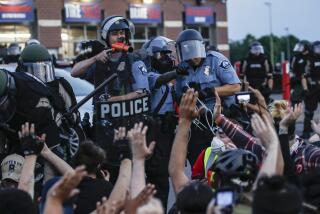6 months after George Floyd’s death, Minneapolis updates police no-knock warrant policy

Minneapolis’ mayor and police chief have changed a policy that dictates how officers should carry out so-called no-knock warrants, saying officers will be required to announce their presence as they enter and to make periodic announcements while inside.
Wednesday’s announcement by Mayor Jacob Frey and Police Chief Medaria Arradondo comes six months after the death of George Floyd and is one of several changes the department has implemented amid calls to defund and revamp the Police Department. The new policy goes into effect Monday.
Floyd, a Black man who was handcuffed, died May 25 after Derek Chauvin, who is white, pressed his knee against Floyd’s neck as Floyd said he couldn’t breathe. Chauvin has been charged with second-degree murder and manslaughter, and three other former officers face charges of aiding and abetting. Floyd’s death renewed calls for an end to police brutality and racial inequities, sparking protests in Minneapolis and beyond.
“This is about proactive policymaking and instilling accountability,” Frey said of the new policy. “We can’t prevent every tragedy, but we can limit the likelihood of bad outcomes. This new, no-knock warrant policy will set shared expectations for our community and clear and objective standards within the department.”
The city said that in an average year, the Police Department carries out 139 no-knock warrants. Police spokesman John Elder said the warrants may be used to preserve evidence and for officers’ safety. He added that while officers might have authorization for a no-knock warrant, that doesn’t mean it will be used — as officers evaluate situations up until the time a warrant is executed.
Officers requesting search warrants must indicate whether they need an “entry with announcement” or an “unannounced entry,” and the warrant must be approved by a judge. In most cases, officers must knock, identify themselves as police, announce their intent and give occupants a reasonable amount of time to respond.
The policy says high-risk warrants may involve immediate or “unannounced entry.” These warrants allow officers to enter a premises without knocking first and are generally handled by SWAT officers.
Louisville, Kentucky, has banned the use of controversial “no-knock” warrants and named the new ordinance for Breonna Taylor
Under the new policy for no-knock entries, officers are required to announce themselves as police before crossing the threshold of the door into a residence or building. Announcements must also be made periodically during the search and at least once when an officer moves to an area where he or she is more likely to be heard, the policy says.
The policy also says that in exceptional circumstances, when giving announcements would create an imminent threat, a supervisor may authorize officers to enter without making an announcement. In those cases, the supervisor must include evidence supporting that decision in an incident report.
Michelle Gross, president of Communities United Against Police Brutality, said the new policy is “pretty disappointing.”
“Nothing about this would decrease the number of no-knock warrants,” she said. “It simply enhances, to a certain degree, the announcement as officers move from room to room. But I don’t see this as being a big advance.”
Gross said her group plans to introduce a bill this session that would ban no-knock warrants statewide, except for in extreme circumstances. She said unannounced entries “should be very rare.”
Frey and Arradondo have issued other policy changes in recent months. One requires officers to document their attempts to de-escalate situations, whether or not force is used. Another change expanded requirements for reporting use-of-force incidents, ordering officers to provide more detail. The city has also banned the use of chokeholds.
Arradondo has also withdrawn the department from union contract negotiations, saying he wants a review targeting the grievance and arbitration process that makes it hard to get rid of problem officers.
More to Read
Start your day right
Sign up for Essential California for news, features and recommendations from the L.A. Times and beyond in your inbox six days a week.
You may occasionally receive promotional content from the Los Angeles Times.







